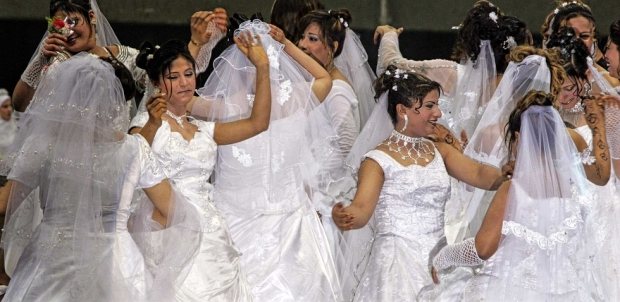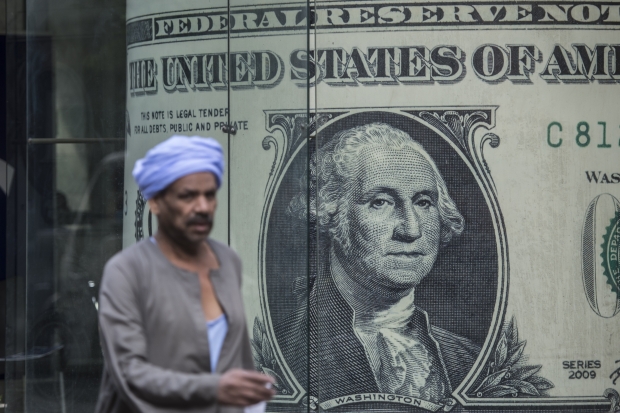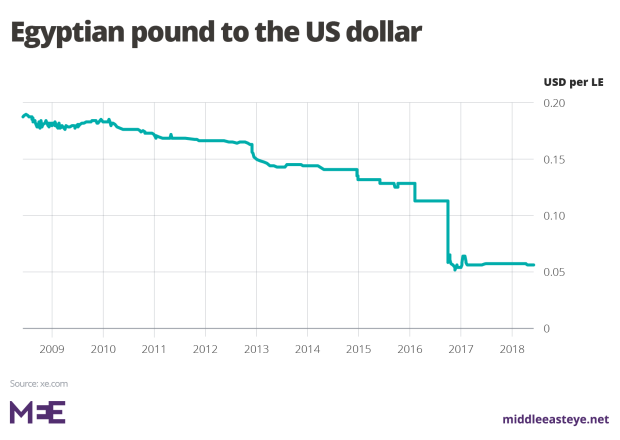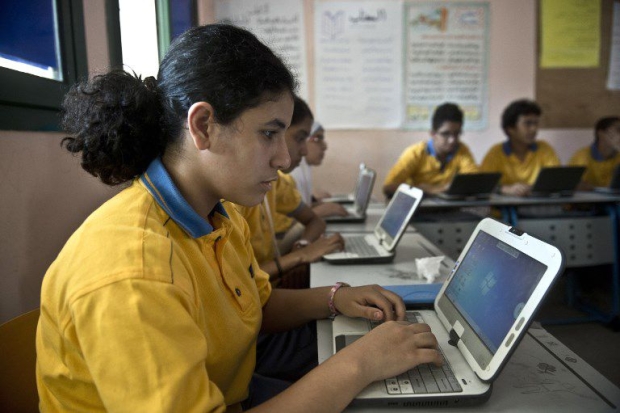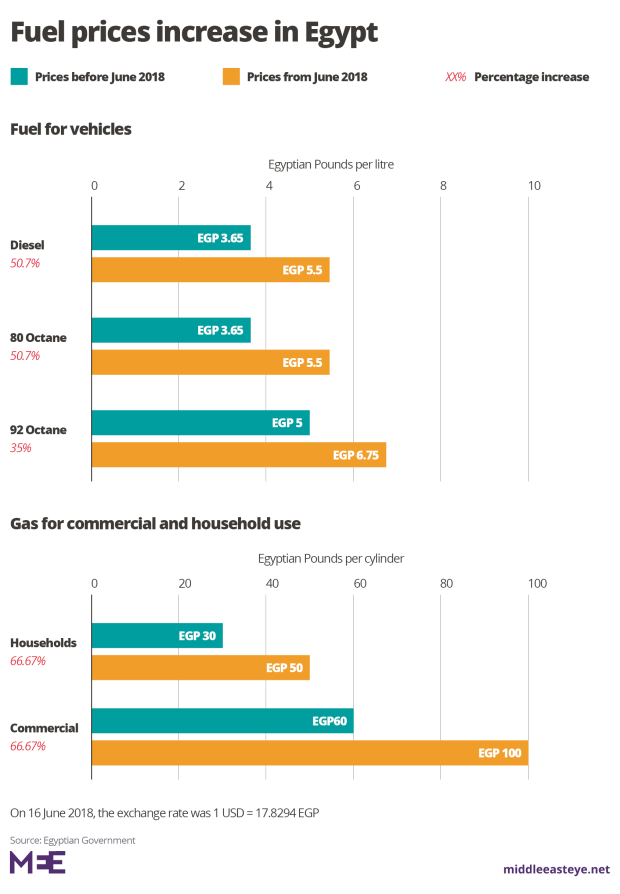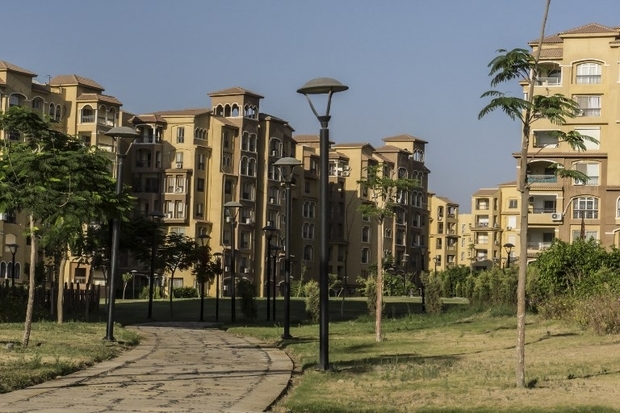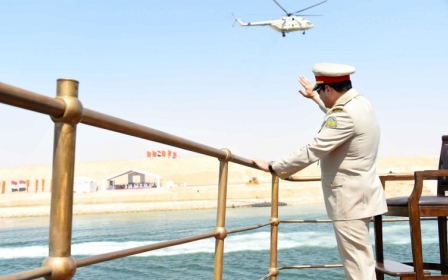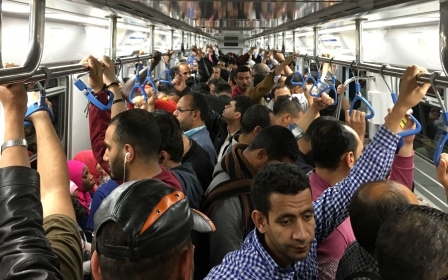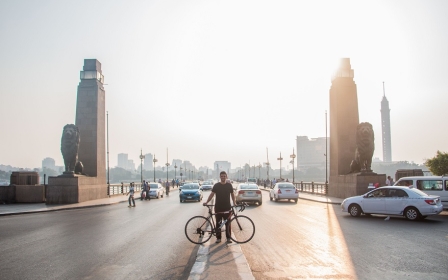'This is not even enough to feed a dog': Austerity bites middle-class Egypt
Ismail Bayoumi used to have plans – big plans. At 27, he is the top-earning manager in a medium-size company with a monthly income of EGP 6,000 ($335).
He wanted to buy a flat. To marry the girl he loved. He should have been able to: after all, a middle-class professional in Egypt typically earns anything from $170 to $560 per month.
But like millions of Egyptians, his life has been wrecked by successive price hikes and rampant inflation.
In two years, the value of Bayoumi’s income has halved due to the collapse of the economy. “The prices of everything have more than doubled since 2016, but our incomes remain the same,” he said.
He explained that furnishing a flat in Cairo used to cost $5,590: now, after devaluation and price rises, that would only be enough to buy electrical appliances.
“I could be better off in a few years’ time, but her family couldn’t wait.”
The salaries of his colleagues, Bayoumi said, range from LE 1500-4000 ($84-224). But basics such as meals come in at around $2.80. “This is not even enough to feed a dog in this country.”
How Egypt pays the price
Price hikes have become a common occurrence of life in Egypt. The country woke up on 16 June – just as it was celebrating Eid - to news of exponentially higher fuel prices and a subsequent rise in transportation tariffs.
It was the fourth price hike since Abdel Fattah el-Sisi became president in June 2014, and the third since the three-year $12bn IMF deal was signed in November 2016.
The pressure on Egypt’s middle classes has been exacerbated by the devaluation of the Egyptian pound, which saw a 150 percent drop against the US dollar. That devaluation led to a sharp rise in the price of basic consumer goods, hitting the poor and middle classes hard.
Egypt is also an import-heavy economy: 75 percent of basic consumer goods come from outside. By the end of 2017, inflation was running at 33 percent.
The June price hikes included a 20-40 percent increase in fares for microbuses, which millions of low-income Egyptians rely on for the daily commute.
The largest increases in fuel prices, 66.7 percent, hit LPG cylinders, which millions of low-income households use for cooking as an alternative to gas. Prices of 80-octane fuel and diesel, used by microbuses and trucks, saw the second highest increase - 50.7 percent.“LPG cylinders used to cost LE7 ($0.40) in the days of Mohamed Morsi. Today, by the time they reach consumers, they cost LE70 ($4), ten times higher,” said Bayoumi.
Property, health, education take a hit
Bayoumi is not the only one to suffer in the current climate. Before the reforms, a middle-income household in Egypt used to earn an average of $1,500 in dollar terms. This has dropped to $300.
Mohammed, a 25-year old plumber, has similarly postponed his marriage plans because his $4,470 savings were no longer sufficient to purchase the two-bedroom flat in one of Cairo’s poorest neighbourhoods. “The price of the same flat is now $8,945,” he said.
Meanwhile Ahmed Zein, a book marketing professional in his early 40s, survives on $168 per month.
“We had to borrow $1,677 to afford my wife’s medical expenses as we had to go to a private hospital for treatment."
The couple has also had to cut the quality and quantity of their weekly shopping to find economies.
We are tired. We have not witnessed any improvement in education or healthcare. We do not get anything in return for the austerity measures
- Mohammed Asaad, professor
Mohamed Asaad, a 30-year-old professor at a private university in Greater Cairo, says his $335 salary had only increased by 7 percent since the devaluation – which means he is losing money once price rises are factored in.
“I would not have faced any problems if the price hikes were matched by a pay rise,” said Asaad, who has two children. “But now I am struggling to maintain a decent living standard for my family.”
Asaad’s lifestyle has changed dramatically during the past two years. “I had to give up many things that are now deemed luxuries, such as social outings, summer holidays, and even gifts to friends,” he told MEE.
The poor quality of public education and healthcare forces many middle-class Egyptians to rely on expensive private services.
Asaad explained that he had spent a fortune on private tutors for his children, as well as using private doctors.
“We are tired. We have not witnessed any improvement in education or healthcare. We do not get anything in return for the austerity measures.”
Government-funded Experimental Schools used to provide the best quality public education in Egypt, offering an English-language curriculum equivalent to private schools but with significantly lower fees.According to the most recent government figures, 85 percent of Egyptian school students are enrolled in public schools. Those enrolled in private schools represent only 7.4 percent.
But in April 2018, Education Minister Tarek Shawky announced they the schools would be “Arabised” because of the high cost of translating Arabic-language curricula into English.
“Those who wish to learn a foreign language can travel abroad for study,” he told a press conference.
Sisi, power and the middle class
Many see the economic changes as a deliberate bid by the government to destroy the middle class because it led to the 2011 revolution.
Yehia Hamed, a critic of Sisi, was a former minister of investment under Morsi, who was deposed in July 2013.
“The middle class is the backbone of society and the source of its balance,” he said. “By destroying it, Sisi is creating an unbalanced society.
“There are many ways to implement subsidy cuts. Sisi chose the worst approach. He did not provide any safety nets. He did not do it gradually. This is meant to exhaust society to the point of political apathy.”
Similarly, Dalia Fahmy, a political scientist at Long Island University, said that austerity measures inevitably depoliticised the middle class.
“The average Egyptian has become so consumed with everyday survival that no one is talking about politics, freedom, the role of the individual or change - the slogans of the 2011 revolution,” she told Middle East Eye.
But supporters of the IMF deal say it was necessary to overhaul Egypt’s economy, despite its impact on the poor and vulnerable.
David Butter, Middle East and North Africa Programme Associate Fellow at Chatham House, said Egypt had no choice but to adopt a rigorous programme to secure the $12bn IMF loan.
'The poorest strata have been protected to a degree, so the middle class and working poor have been clobbered. Was this deliberate? Not really'
- David Butter, Chatham House
“If you are talking about where the economy was 2016, the indicators were extremely worrying,” he said.
The government was “in poor shape” he said, due to low levels of foreign exchange reserves, a fiscal deficit running at 12-14 percent of GDP, weak growth and a big gap between the black market and the official exchange rate.
“Most of what came after the IMF deal was signed was dictated by the exchange rate reality,” he said. “If they hadn't floated, who knows, the black market rate could be 40 or 50 now and foreign exchange reserves would be effectively zero.
“The poorest strata have been protected to a degree, so the middle class and working poor have been clobbered. Was this deliberate? Not really.”
What are the alternatives?
But economists critical of the IMF deal emphasise that economic growth is possible using alternative measures. Professor Ahmed Zekrallah, an Egyptian economist at the Istanbul-based Egyptian Institute for Studies, said that a five-year economic strategy centred on bolstering productivity could fix structural flaws in Egypt’s economy.
“The macroeconomic indicators referred to by the IMF are all symptoms of a chronic illness, namely lack of productivity,” he said. “Sisi went for a rigorous IMF programme due to his neoliberal tendencies and lack of an economic vision.”
Sisi went for a rigorous IMF program due to his neoliberal tendencies and lack of an economic vision
- Ahmed Zekrallah, economist, Egyptian Institute for Studies
Another problem, Zekrallah said, was that the economic measures took place simultaneously and rapidly, sparking downward mobility for most Egyptians. “The majority of Egyptians now live in poverty.”
In some governorates in Upper Egypt, poverty rates in 2018 reached as high as 60 percent, according to the World Bank.
It reported: “The high inflation accumulated over the course of FY15-FY17 has lowered the purchasing power of households across the distribution, reducing the positive spillovers of economic growth; taking a toll on social and economic conditions.”
The Egyptian government has not published data on poverty rates in four years: in 2015 it said that the rate was 27.8 percent, up from 26.3 percent in 2013.
According to Zekrallah, cuts to subsidies should have only taken place at the same time as social policies designed to alleviate the suffering of the poor and middle classes, such as increasing education and health budgets.
“Education and health expenditure represents 60 percent of the income of middle-class Egyptians,” he said. However, he added, their share in this year’s budget was now below the percentage stipulated in the constitution.
Will Egypt’s middle class see the harshest parts of the IMF deal reversed after the end of the programme?
Fahmy is not so sure.
“It is not clear we will see the perceived stability of the IMF when we are seeing the seeds of instability being crystallised in society through these extreme measures.”
Middle East Eye propose une couverture et une analyse indépendantes et incomparables du Moyen-Orient, de l’Afrique du Nord et d’autres régions du monde. Pour en savoir plus sur la reprise de ce contenu et les frais qui s’appliquent, veuillez remplir ce formulaire [en anglais]. Pour en savoir plus sur MEE, cliquez ici [en anglais].


